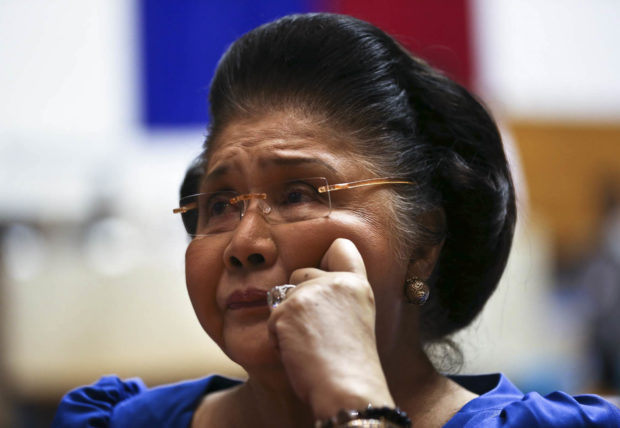Imelda Marcos seeks graft acquittal

Rep. Imelda Marcos at the Session Hall of Congress, Quezon City.
INQUIRER FILE PHOTO/LYN RILLON
Former first lady Imelda Marcos has sought acquittal for graft charges arising from her interest in foundations that were allegedly used in maintaining the Marcos family’s bank accounts in Switzerland.
Imelda argued before the Sandiganbayan that her transactions with the Swiss foundations were no longer unconstitutional under the 1987 Constitution, although these were under the 1973 Charter.
The Anti-Graft and Corrupt Practices Act prohibits public officials from having financial or pecuniary interest in any businesses or transactions banned by the Constitution.
In a 12-page memorandum filed on Tuesday, Marcos said that the prohibition in the 1973 Constitution was deleted from the 1987 Constitution, which came into force a year after a people’s revolt toppled her husband, strongman Ferdinand Marcos, from power.
“Hence the prohibition against intervention in matters before government offices no longer applies to Cabinet members,” read the memorandum prepared by her lawyer Robert A.C. Sison.
Article continues after this advertisement“The result is that it is no longer a crime under Section 3(h) of [the antigraft law] for a Cabinet member to intervene in any matter before a government office for his pecuniary benefit,” it added.
Article continues after this advertisementThe prosecution had earlier submitted its memorandum detailing how Imelda Marcos was involved in various Swiss foundations.
The foundations were allegedly used to maintain bank accounts containing millions of dollars for the benefit of the Marcos family, even as Imelda and Ferdinand declared a lawful income of only $957,487.75 from 1965 to 1985 in their income tax returns.
The Office of the Ombudsman, which recently rested its case, said Imelda’s financial interest in Swiss foundations while serving as a Batasang Pambansa assemblywoman and Metro Manila governor violated the 1973 Constitution.
In its memorandum, the Office of the Special Prosecutor (OSP) sought Imelda’s conviction on 10 counts of violation of Section 3(h) of the antigraft law.
The OSP said it had sufficiently proven Imelda’s involvement with private foundations to be unlawful, noting that she failed to even testify in open court to refute the evidence or at least deny the allegations.